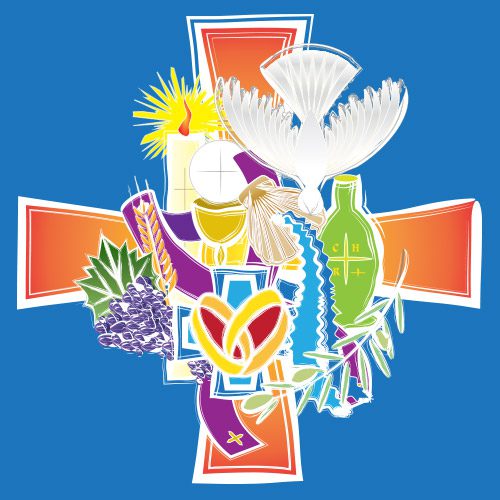Becoming Catholic
Order of Christian Initiation of Adults
OCIA (Order of Christian Initiation for Adults) is the process for preparing and receiving adults into the full communion of the Catholic Church. If you want to become Catholic or have questions about the faith, contact Dcn. Mark Ripper at 410-857-9714 or meripper@outlook.com.

25/26 OCIA Sessions
Weekly Sunday morning sessions
Start Date: Sunday, September 28, 2025
Time: 9:30am – 11:30am
Location: Parish Center
The program offers an exploratory period to help you discern your calling, followed by preparation for your reception into the Catholic Church at Easter, which will be celebrated on April 4, 2026.
If you are interested in participating or have any questions, please contact Dcn. Mark Ripper at 410-857-9714 or meripper@outlook.com.
Why is the Process so long?
In our busy world today, we have become used to immediate gratification and a feeling that if we want something, we are entitled to it and feel we have a right to set the conditions of reception. Our Catholic Church, in her wisdom, views the process of OCIA much differently. The process of becoming fully initiated into the Roman Catholic Church takes time.
The process needs to be authentically truthful (implying the process is far removed from the easy sound-bite answers and errors of the culture), authentically personal (implying pastoral flexibility) and completed in stages.
What are the Stages of OCIA?
Evangelization and Pre-catechumenate stage – Inquiry into the Church followed by Acceptance into the Order of Catechumens.
Catechumenate stage – Conversion and growth of catechumens’ faith through celebrations of the Word, study and prayer leading to the Rite of Election.
Enlightenment/purification stage – Immediately precedes the elects’ initiation, usually the Lenten season. An intense time of reflection marked by the Scrutinies.
Mystagogia stage – Post-baptismal phase during which newly baptized experience the fullness of the Christian life particularly in the Sunday Eucharist.
Pre-catechumenate
This initial stage of the process takes place for three-four months. During this time, inquirers participate in weekly sessions on the basics of the Christian faith. They learn about Sacred Scripture and Sacred Tradition. Sessions include discussions on the books of the Bible, Salvation History, the Trinity, Prayer and the “Universal Call To Holiness”. During this stage, participants are encouraged to get their questions answered, pray regularly, come to Mass, meet with their Sponsor, and most importantly, be open to the prompting of the Holy Spirit. At the end of this stage, the inquirers are asked to make their desire to become Catholic known to our faith community. This generally takes place during the Advent or Christmas seasons, through the Rite of Acceptance and the Rite of Welcoming.
What are the Rite of Acceptance and the Rite of Welcoming?
The Rite of Acceptance into the Order of Catechumens is for those who are preparing for their Baptism. They are now ready to publicly declare their intention to continue their journey towards becoming Catholic. At this Rite, they are asked to more fully embrace the Gospel message with the help of God, and are also signed with the Cross to show they belong to Christ, the Shepherd of souls. In this Rite, which takes place at one of our weekend liturgies, the parish community has the opportunity to more fully participate in and pray for those in OCIA. This Rite also places the catechumens in a formal relationship with the universal Church. By Church law, the Pope and all bishops are to pray for those who have gone through this Rite.
The Rite of Welcoming is for inquirers who have been previously baptized and are ready to publicly declare their intention to continue their journey towards full communion with the Catholic Church. At this Rite, which takes place in conjunction with the Rite of Acceptance, they are asked to express their willingness to listen to the apostle’s instruction, gather with the worshipping community in prayer, and join that community in the love and service of others. They are signed with the Cross as an acknowledgement that they belong to Christ.
Adult Confirmation
If you’re a baptized Catholic adult (aged 18+) who has not yet received the Sacrament of Confirmation, you can participate in a weekly program over 5 weeks that usually occurs twice a year in the spring and fall. The program leads to confirmation by the archbishop or by an auxiliary bishop. Announcements about the beginning of a program will appear in the parish bulletin. You can also ask to be put on a list of interested adults ahead of time by contacting the Parish Center at 410-848-4744 or info@sjwest.org.
Fall 2025 sessions begin in mid-September with confirmation on October 26 at the Baltimore Basilica. Email Deacon Joe at cinquino814@msn.com to sign up!
Additional Questions & Answers
Beginning with the Sunday after the Rite of Acceptance and the Rite of Welcoming, the OCIA Catechumens and Candidates begin sitting as a group for the 9am Mass. They will be dismissed after the Liturgy of the Word. This will continue each Sunday until Easter, when at the Easter Vigil, they will join us in receiving Holy Communion for the first time. The parish is not sending them out because they are somehow “unworthy” to stay for the Liturgy of the Eucharist. Though they cannot receive the Eucharist, Mother Church still has an obligation to feed those who have entered into a relationship with her through the Rite of Acceptance and Rite of Welcoming. God’s Word is their only food during this period. After they are dismissed, they will go to the Parish Center to continue learning about the Faith, especially the sacraments.
On the first Sunday of Lent, St. John will join parishes all over the world and send their Catechumens and Candidates to meet with one of our Bishops. In the Archdiocese of Baltimore, there are several places where parishes gather, and here at St. John, we go to the Cathedral of Mary Our Queen in Baltimore. To send a catechumen or candidate to the bishop means that a parish has discerned that a person is ready to enter the Catholic Church. In Sacred Scripture, the Book of Revelation makes reference to a “Book of Life,” in which are written the names of those who have chosen to follow the Lord Jesus and be baptized. Those who are already baptized, as Catholics or in other denominations, had their names written in the Book of Life at their Baptism. When they meet with the Bishop, those who will be baptized at the Easter Vigil will participate in the Rite of Election. Those who will be fully initiated into the Catholic Church will take part in the Rite of the Call to Continuing Conversion.
This Rite makes a key moment. For the catechumens, this Rite signifies that they have been called by Christ and attests to the reality that only those mystically claimed by Christ will enter Heaven. Throughout the RCIA process, catechumens should have become increasingly involved with the parish community. The community, with sponsors representing the parish will attest to the participant’s readiness. It is appropriate for the bishop to recognize them because he is the sign of unity of the particular Church (diocese), and it is the parish community’s responsibility to bring those in RCIA into the fullness of the life of the Church. The decision of an RCIA participant to go through this Rite means that the judgment and decision-making (of both the catechumen and the parish) about whether to enter the Catholic Church has ended. From this point forward, they are no longer Catechumens but are called the “Elect.” They have been chosen to enter into the final period of preparation for initiation, and called by the bishop, their shepherd, to the holy mysteries to be celebrated at Easter.
For all those who have been baptized, the reality of being chosen and claimed by Christ took place at their Baptism. This is true for the baptized candidates as well. Therefore the Rite of Election is inappropriate for them; they are already among the elect in Christ. Instead, the candidates are “called to continuing conversion,” and thus their intention to be fully initiated and share in the Eucharist is recognized. This Rite also takes place before the bishop as part of the same liturgical event as the Rite of Election for those who are unbaptized. With their sponsors standing in support of them, the candidates are addressed by the bishop: “Hear the Lord’s call to conversion and be faithful to your baptismal covenant.” (RCIA 454) Together with the Elect, the candidates are thereby moved by this Rite into a period of intense spiritual preparation.
These Rites are celebrated to help deliver the Elect from the power of sin and Satan, to protect them again temptation, and to give them strength in Christ, who is the Way, the Truth and the Life (OCIA 141). The Rites of Scrutiny are meant to uncover, and then heal, all that is weak, defective or sinful in the elect’s hearts and to bring out through repentance all that is upright, strong and good. Three Scrutinies are celebrated in the parish community on the 3rd, 4th and 5th Sundays of Lent, after the homily.
